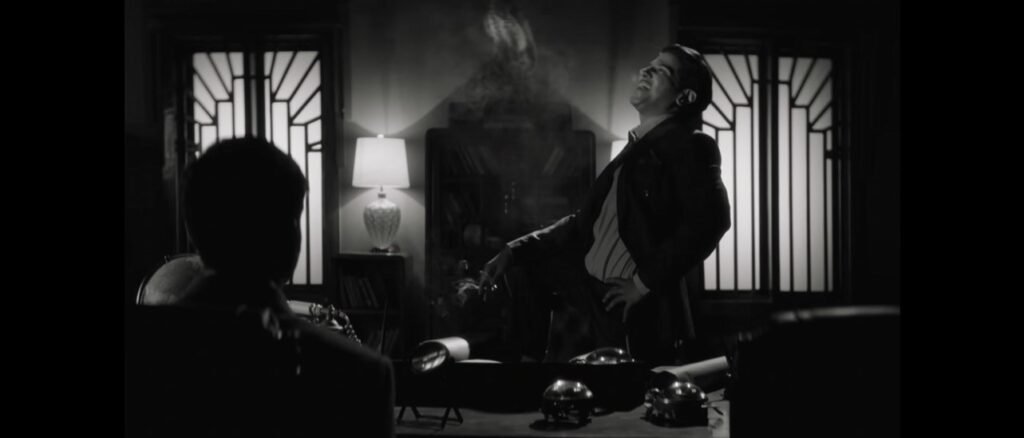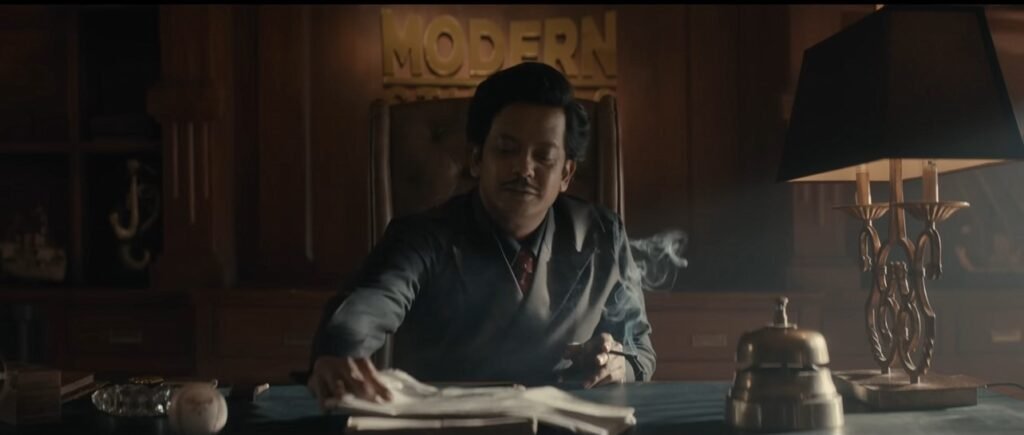Kaantha Story :-
A legendary director and his leading actor lock horns over creative control during a film production in the 1950s.
Kaantha Release Date, Trailor, Songs, Cast :-
| Release Date | 14 November 2025 |
| Language | Tamil |
| Genre | Action |
| Duration | 2h 30min |
| Cast | Bhagyashri Borse, Dulquer Salmaan, Rana Daggubati, Samuthirakani, Bijesh Nagesh |
| Director | Selvamani Selvaraj |
| Writer | Selvamani Selvaraj, Tamizh Prabha |
| Cinematography | Dani Salo |
| Music | Jhanu Chanthar |
| Producer | Rana Daggubati, Prashanth Potluri, Dulquer Salmaan, Jom Varghese |
| Production | Spirit Media, Wayfarer Films |
| Certificate | 16+ |
Kaantha Review :-
Films about filmmaking often buckle under their own self-awareness, but Kaantha avoids that trap by portraying its 1950s film set not as a nostalgic museum piece, but as a cage match in period costume. Director Selvamani Selvaraj crafts a story that feels like a Shakespearean tragedy, where ego, ambition, and betrayal unfold against the backdrop of a troubled production. While some reports connect the story to the life of M. K. Thyagaraja Bhagavathar, the film is thankfully fictional—borrowing perhaps a detail or two, but otherwise inventing its own dramatic chaos. The film embraces the era’s formal, theatrical dialogue and heightened performances, treating them not as flaws, but as essential to capturing a time when cinema operated under very different sensibilities.
The setup seems deceptively simple. KT Mahadevan (Dulquer Salmaan), a star who has outgrown his mentor’s shadow, arrives to reshape a project called Shaantha into something that suits his own image—renaming it Kaantha. Ayya (Samuthirakani), the veteran director who discovered him in street theater and nurtured him into stardom, watches his authority erode shot by shot. Their true battleground becomes Kumari (Bhagyashri Borse), a Burmese refugee and the film’s leading lady, whom both men manipulate as leverage. Ayya, who found her and gave her this opportunity, hopes to use her to reclaim control and shift attention from his star. Mahadevan, despite being married to a media baron’s daughter, falls for her anyway, igniting a dangerous, combustible tension.
What makes this dynamic compelling is the film’s exploration of performance itself. It’s often unclear when Mahadevan is acting and when genuine emotion emerges. Is his devotion to Kumari real, or is Ayya right in seeing every gesture as calculated theater? This ambiguity drives the story, keeping viewers second-guessing motives as events build toward their inevitable climax. Selvamani embraces the theatricality rather than downplaying it. The brownish, desaturated palette evokes the period without sapping vitality, while the confined sets enhance the stage-like aesthetic. Early on, when a gun appears, the audience senses it will eventually be fired—the tension lies in who will pull the trigger and why.
When the story takes a darker turn, Inspector Devaraj (Rana Daggubati) turns the film set into an interrogation stage. He’s a power-hungry cop who thrives on cornering suspects with theatrical flair and rapid-fire deductions that would never hold up in real life. But Kaantha isn’t aiming for gritty realism—it’s a heightened spectacle, where testimonies feel less like standard questioning and more like confessional monologues. Even supporting characters—the studio head (Ravindra Vijay), Ayya’s assistant (Bijesh Nagesh), Mahadevan’s driver (Vaiyapuri), his wife (Gayathrie Shankar), father-in-law (Nizhalgal Ravi), and Devaraj’s aide (Bagavathi Perumal)—get brief but memorable moments that land effectively.
Dulquer Salmaan deserves credit for his adventurous script choices and the commitment he brings to each role. He embodies the old-school star mystique without overdoing it, delivering calculated glances and mannerisms that occasionally give way to vulnerability. His chemistry with Bhagyashri Borse sidesteps conventional commercial tropes, favoring a subtle, authentic romance suited to an era when affection couldn’t be overtly displayed. Bhagyashri navigates the tricky role of a woman caught between Ayya’s manipulation and genuine feelings for Mahadevan, ensuring Kumari never becomes just a pawn. Samuthirakani brings weight and authority to the spurned mentor without tipping into caricature, while Rana Daggubati fully commits to the dramatized cop persona—implausible, perhaps, but theatrically satisfying.
Kaantha Trailor :-
Kaantha falters in its predictability. Red herrings are scattered throughout, but once the pieces fall into place, the story’s trajectory becomes clear. The affair between Mahadevan and Kumari also unfolds with an oddly blatant lack of discretion. For a married star in that era, Mahadevan pursues the romance so openly that anyone with a camera could—and does—capture it. A little more subtlety would have made the ensuing blackmail feel earned rather than inevitable. You keep waiting for the plot to take sharper twists, but it mostly delivers exactly what you’ve already anticipated.
Final Thought
Jakes Bejoy’s score carries much of the film’s weight, adding layers of mystery even to its dialogue-heavy scenes, while editor Anthony keeps the 163-minute runtime disciplined, cutting before moments overstay their welcome. Selvaraj portrays the workings of 1950s filmmaking with enough detail that the crew dynamics and the near-godlike authority of the major players—the star and the director—feel grounded in reality. The film is aware that it leans on archetypes and classical structures, and rather than trying to subvert them, it plays them straight, executing them with enough craft that the familiar moves still hit. Sometimes, sheer commitment is more effective than cleverness.
Also Read the Movie Review:- Being Eddie (Netflix) Story, Review, Trailer, Release Date, Songs, Cast 2025




batumi city tours The trip was relaxing, fun, and educational. https://www.scamadviser.com/check-website/travelshopbooking.com
sacsayhuaman cusco tour Every transfer, every meal, and every visit went flawlessly. https://dijital.link/travelshop